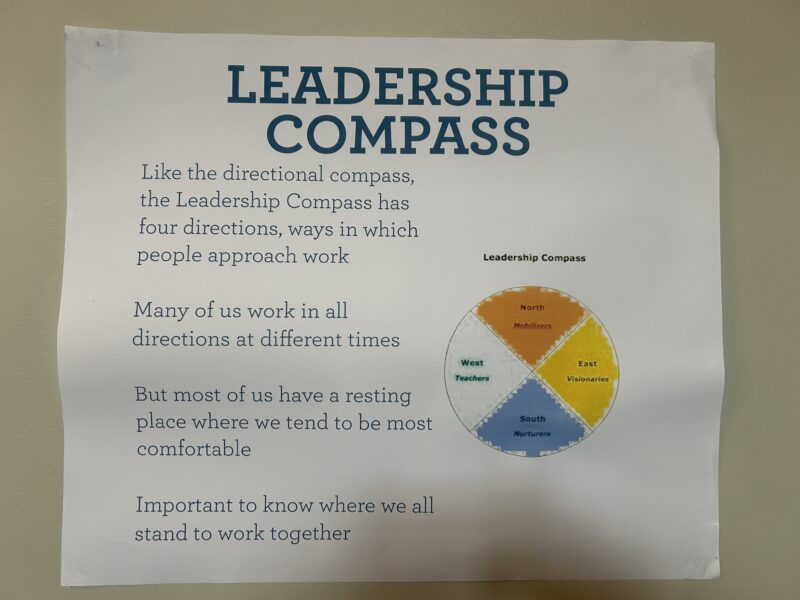
The Hyde culture can be hard for new students and parents to grasp. Despite the fact that it’s been on the Hyde scene pretty much from the beginning, no aspect is harder to understand than Brother’s Keeper (BK). Here’s my way-too-long-for-a-blog take on the concept, broken down as follows:
– What is it?
– Some BK History
– Common Resistance
– Forgiveness
– Profound Commitment to Kids – The Essential Ingredient
– It’s Complicated
– My Story
What is it?
Hyde students are expected to encourage the personal best of their peers as well as call each other on their indiscretions. For example, if you observe Johnny smoking a cigarette downtown, you have a responsibility to do something about that. You are expected to tell Johnny to turn himself in to the Dean’s office and make it clear that if he doesn’t, you will. If you do not, and it later becomes known that you did not – and such things have a near magical tendency to become known at Hyde (!) – you will find yourself in the same disciplinary boat as Johnny.
Brother’s Keeper helps to create a community of people who care for each other, who help to make it a safe environment, and who encourage members to take risks and commit to their personal best. In a BK community, working hard and taking risks is cool. While most kids start out with a distaste for BK, they tend to become ardent advocates once they benefit from it – i.e., once they accomplish something that they did not think they could accomplish – and they then make the connection between the accomplishment and the fact that somebody pushed them to take this new step.
It’s important to differentiate between BK, the philosophical concept (“We help others achieve their best.”) and BK, the disciplinary procedure as practiced at Hyde. The ultimate goal is to graduate kids who will grow into adults who recognize that they will never achieve their best without the help of others and that they should not expect that help if they are unwilling to offer it to others. It’s a 2-way street. The rest is just details.
Some BK History
There are over four decades of history to BK at Hyde. I was a student in the earliest days, back when it was called the Honor Code. We would generally agree to turn kids in for lying, cheating, and stealing, because we genuinely thought those things were wrong… But we were reluctant to do so for alcohol, tobacco, and drugs because we saw those things as “the school’s rules” and not inherently wrong. Not only do today’s kids not want to turn their peers in for anything, I’ve encountered more than a few parents who would rather have their children steal than smoke pot.
“Back in the day” it all came to a head in 1970 (my sophomore year) during an event known in Hyde lore as “The Bust.” Up to that point, kids were expelled for breaking ethics. The Bust uncovered the ugly fact that 100 of Hyde’s 120 students were guilty of something. Faced with choosing between steadfast adherence to precedent (and thereby closing the school!) OR looking at things differently, the faculty chose the latter, and BK was born.
Common Resistance
Much of the early disdain for BK is due to the fact that a student’s initial association with it tends to be negative. Typically, a boy or girl has committed a violation of school ethics and does not want to accept accountability for it at the hands of a “brother” or “sister.” However, it can be equally trying when a boy or girl has witnessed another student committing a violation and is loathe to get involved in the ugly social repercussions of acting as a brother’s or sister’s “keeper.” It’s common for some students to initially experiment with a mode of operation where they toe the line themselves but keep the blinders on relative to their peers. That’s a typical stop on the path of one’s evolution.
However, later on, after a student begins to perform well academically, scores a few goals out on the soccer field, or sings a solo in a school production, the student realizes that he or she might never have accomplished these things without the positive peer pressure of BK. During my daughter’s senior year at Hyde (2010), I had the pleasure of watching her lacrosse team win the league championship after trailing by three goals with less than five minutes to play. Although I didn’t ask them as they were hoisting the championship trophy, my guess is that they thought BK was pretty cool at the time. (See Above Photo) After such experiences, the veteran student generally regards BK in a positive light – but it’s often not until then.
Forgiveness
I’ll never forget the time a distinguished New England head of school came to visit Hyde ready to do battle over what he perceived to be our “harsh, unforgiving” disciplinary program. At the end of his visit, he exclaimed, “This is the most forgiving school I’ve ever seen! It’s definitely more forgiving than my school.”
All kids fight BK. However, most come to realize that it works at Hyde precisely because Hyde is such an incredibly forgiving place. (Although I grant you, it may not feel like it when you’re out raking leaves on a cold New England fall day.) At traditional schools, BK would have trouble working because such schools cling to an archaic policy of expulsion. (I call it the “Cops & Robbers Syndrome” – the kids are the robbers and teachers are the cops.) Kids would never turn their peers in because they would fear that they would be ruining their lives. Hyde’s experience proves that if the schools will change, the kids will follow suit.
It’s impossible to talk about BK without referring to work, or more specifically, Work Crew. Chances are if you find yourself on the receiving end of BK, you will spend some time on Work Crew. This may find you cleaning windows, picking up litter, or shoveling snow during times when your peers might be kicking back and enjoying themselves. Sadly, the whole notion of work has come to be regarded with such disdain these days that kids perceive Work Crew as “cruel and unusual punishment.” I repeatedly find myself lamenting, When did work get such a bad rap in America? After all, any successful adult will tell you that a great work ethic is critical to success! However, at the end of the day, if you truly detest manual labor, then you would do well to remember the wisdom of an old adage: If you can’t do the time, don’t do the crime.
Profound Commitment to Kids – The Essential Ingredient
Years ago while attending a conference, I was approached by the headmaster of a traditional school who asked me if I thought Brother’s Keeper might work at his school. I asked him, “Would you and or your board be open to either abandoning or dramatically revising your expulsion policy?”
He replied, “Probably not.”
I responded, ”Probably not.”
Brother’s Keeper cannot be added to a school culture in the same way one might add a stereo component to a home sound system. It’s a wholistic concept that must be wired directly into the culture and practiced by all participants. When it works, it is synchronized with everything from the initial admissions decision to graduation evaluations and speeches. (Now there’s another concept unique to Hyde!)
While expulsion happens at Hyde, I know of no school that hangs with kids as long as we do. When I was headmaster of Hyde-Bath, I frequently exhorted our faculty with two proclamations:
– ”As long as I am headmaster, we may sometimes be guilty of giving kids too many chances, but let’s never be guilty of giving too few.”
– “I’d rather be the man who bought the Brooklyn Bridge then the man who sold it.” (I sometimes uttered this in defense against charges of gullibility in the face of a kid’s vows to do better… for the 5th or 6th time.)
It might be possible to have authentic Brother’s Keeper with a more moderate commitment to kids… but I doubt it.
It’s Complicated
BK is complicated. It takes years to understand. (In fact, my father, Hyde’s founder, gets very specific about it, claiming that it typically takes three years.) One of the great things about Hyde’s charter schools is that we start working with the kids in elementary school on concepts like BK. It’s perhaps unfortunate that in our boarding schools we often find ourselves giving a crash course to students who may only be with us a couple of years.
I recently attended a school meeting at Woodstock that featured recent alums on stage talking about their efforts to apply what they’ve learned at Hyde to the challenges of the outside world. During the Q&A phase of the meeting, one student pointedly asked the alums, “Do you really do Brother’s Keeper in college?”
One of the college students replied, “Definitely.” Nearly all of the others nodded in agreement. What was clear was the difference in mindsets between the questioner (a newer student who didn’t appear to be much of a fan of BK) and the “answerer” (an alum who, having once been a Hyde student, could certainly identify with the questioner’s attitudes about BK). They were two ships passing in the night.
The student, still in the early stages of understanding, meant, When you see kids breaking rules, do you turn them in? Being a relatively new student, he had trouble seeing beyond BK as anything other than a snitch system.
The alum, thinking on a deeper level (and having been knocked on his tail a time or two since graduating from Hyde), observed that college becomes both easier and productive once you establish a network in the form of a productive peer group that will both support and challenge you. College (and life itself) is pretty tough to do on your own. And a peer group works both ways: you give and you get.
This alum’s off-the-cuff remarks focus the reason we value BK at Hyde. Neither I nor Hyde’s most seasoned veterans have ever assumed that Hyde grads will fall into lockstep with BK as practiced at Hyde. After all, this goes back to Forgiveness. BK works at Hyde for the very reason that Hyde is such a forgiving place. It also works because all members of the Hyde community have made a commitment (even if it might sometimes be uttered under false pretenses!) to uphold the Hyde ethics. When kids get to college, they enter a world that is far less forgiving to say nothing of one that features a diversity of ethical viewpoints. It’s natural for college kids to both test and explore their ethics. Furthermore, it’s entirely appropriate given the fact that unlike Hyde students, they are also adults.
It is our hope that exposure to BK at Hyde will prepare our students to establish interpersonal relationships – with both individuals and groups – that will help them be the best they can be. We also hope that they will someday pass the importance of this idea on to their own children.
My Story
The first paper I submitted as a freshman at Bowdoin College was a 2-pager in English Composition. Feeling it to be one of the finest pieces of academic work I had ever done, I eagerly awaited the professor’s verdict. A few days later, the professor returned it to me all marked up in red ink with a grade at the top that read “D-/F.” Although I had never seen that grade before, something told me that it wasn’t a good thing. I soon found out that this was the lowest grade one could receive at the college that was not an F. Suffice it to say that my world was rocked.
Distraught, but guided by false pride, I initially told no one and certainly didn’t ask anyone for help. After receiving a few more less than stellar grades in other classes, I broke down and approached my roommate, a guy who seemed to effortlessly receive A’s on anything and everything that he wrote.
He good naturedly offered to critique my work. He also asked me, “How honest and frank do you want me to be?” I responded with, “Brutal… no holds barred.”
A few days later, I presented my roommate with the draft of a paper that had been assigned in a political theory course we took together. He attacked it. I recall that the paper had included an observation prefaced with something like, “It’s only human nature for man to yada, yada, etc.….” Upon reading this, my roommate turned to me and said, “Oh, I see… so now you’re an expert on human nature. Exactly when did that occur?” He must have read the resentment on my face as he softened the blow by asking, “You sure you still want brutal?” I responded with the mid-70’s equivalent of “bring it.”
While I cannot report that immediately after this exchange I began to knock down A’s on my papers, I can say that I stand eternally grateful for the tutoring (mixed with a bit of tough love) that my roommate gave me. I credit him with helping me take some big steps forward academically.
However, I also credit myself for intentionally seeking out and voluntarily entering into a demanding and challenging tutorial relationship… a Brother’s Keeper relationship . Sometimes asking for help is not enough. Sometimes you have to seek out the help that you might not want but it’s the help that you know you need. (You also cannot always be on the receiving end of this dynamic! Sometimes you need to reciprocate.) My own Hyde education helped steer me to do just that.
“We help others achieve their best.” That’s what Brother’s Keeper means. It sounds simple, but it’s probably the hardest concept a Hyde student has to learn. That’s OK, because it also offers a lifetime of value.
Onward, Malcolm Gauld



